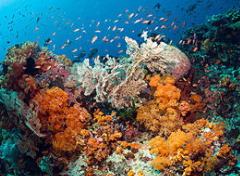- 阅读
- 阅读
- 技巧
- 百科
- 试题
- 文化
- 技能
Muck diving sounds the very antithesis of coral-reef diving.
漫潜听起来与珊瑚礁潜水相对立。
Reef divers swim through a world of colourful coral heads populated by strikingly patterned fish,
暗礁潜水者游过一片彩色的珊瑚岬世界,这里居住着各种鱼类、
scuttling arthropods and awesome molluscs.
其他节肢动物以及软体动物。

Muck divers explore apparently unpromising sand flats and muddy silts devoid of visible inhabitants.
漫潜者探索的是毫无前途的沙坪区域以及没有任何可见居住动物的泥沙区域。
Top of the list is that master of disguise, the mimic octopus,
排在名单首位的是伪装大师—拟态章鱼,
which evades predators by masquerading as other, venomous, animals—lionfish, sea snakes, even jellyfish.
它们通过伪装成其他有毒的动物,如狮子鱼、海蛇甚至水母,躲避捕食者。
This ability may explain why it remained unknown to science until 1998.
这种能力或许可以解释为什么直到1998年它们才被科学发现。
Other popular stars are the hairy frogfish (pictured) and the wonderfully titled colourfully garbed flamboyant cuttlefish.
其他受喜爱的明星是毛茸茸的襞鱼(如图)以及着装艳丽的乌贼。
Tourists looking for these beasts bring employment. Spotting the eye of a mimic octopus in the sand, or a frogfish—
寻找这些野兽的游客带来了工作机遇。发现藏于沙粒中的拟态章鱼的眼睛或襞鱼—
an ambush hunter so cleverly camouflaged that it blends to invisibility on the substrate it uses as a hunting platform—needs lots of experience.
猎人的埋伏伪装如此巧妙,在底层近似于隐形,猎人也会将这个底层用作是一个捕猎平台 — 需要大量经验。
Keen-eyed young Filipinos are therefore finding work in the diving industry as guides,
因此眼光敏锐的菲律宾年轻人在潜水行业找做导游的工作,
and can earn double a fisherman's wage selling their sleuthing skills to outsiders.
并且他们挣到的薪水是渔民向外人传授侦查技巧所得的两倍。
As is often the case with ecotourism, though, there is a risk of the tourists killing the thing they love by turning up in numbers so large that they harm the habitat.
虽然这是生态旅游的常态,但游客人数如此之多可能会扼杀他们所热爱的事物,最终破坏栖息地。
Dr De Brauwer believes more study should be directed towards understanding the impact both of divers
De Brauwer博士认为应该对理解潜水者和
and of nearby fishing activity on the creatures which make the muck their home.
附近捕捉海洋生物(以淤泥为家的生物)活动的影响做更多研究。
The guides agree, voicing concerns that overcrowding on dive sites could drive the most treasured critters away.
导游们表示同意,并表达了他们的担忧—潜水地点的过度拥挤可能会赶走最珍贵的生物。
Some have already seen evidence of this happening.
一些人已经看到了这种情况发生的证据。
Whether the authorities will go so far as to regulate numbers is moot.
当局是否会对人数进行如此严格的监管,目前尚无定论。
But at Dauin the proceeds of a fee which divers are charged for each excursion do at least pay for a coastal patrol
但在道因,向潜水者收取费用正在进行,至少要给监视海洋保护区
that watches over marine sanctuaries to prevent illegal fishing.
以防止非法捕鱼的海岸巡逻队付钱。
People in the area are certainly aware of the risk of killing the goose that lays the golden eggs.
这片区域的人肯定意识到了捕杀可以产下金蛋的天鹅的风险。
On the other hand, many of them need the gold now.
另一方面,其中很多人现在就需要金子。
来源:经济学人
参与评论